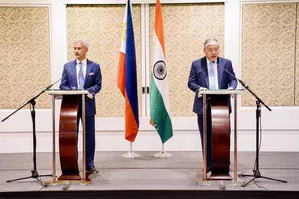India Supports Manila After Beijing’s Actions in South China Sea

India firmly supports Philippines in South China Sea dispute
Manila, March 26 (IANS) External Affairs Minister S. Jaishankar expressed India’s firm support for the Philippines after the latter lodged a protest against Chinese actions in the disputed South China Sea. The Philippines summoned a Chinese diplomat in response to a recent incident involving its coast guard and Filipino navymen.
Jaishankar, speaking alongside Enrique Manalo, Secretary for Foreign Affairs, emphasized the importance of upholding the United Nations Convention on the Law of the Sea (UNCLOS). He stated, “India follows all developments with great interest…the progress and prosperity of this region is best served by staunch adherence to the rules-based order.”
Amidst repeated confrontations between Manila and Beijing, China defended its actions, describing them as “lawful regulation”. The UNCLOS plays a crucial role in establishing the international legal order of the seas and oceans, which India staunchly supports for freedom of navigation and commerce.
During discussions, Jaishankar highlighted the potential for bilateral maritime cooperation between India and the Philippines. He also noted the significance of India’s partnership with the Philippines in the context of engagement with the ASEAN, as the Southeast Asian nation will take over as New Delhi’s country coordinator later this year.
As part of his three-nation tour, Jaishankar is aiming to strengthen bilateral relations with Singapore, the Philippines, and Malaysia. The recent meeting between the two leaders underscored the shared interest in a free, open, and inclusive Indo-Pacific region, emphasizing the peaceful settlement of disputes and adherence to international laws.










